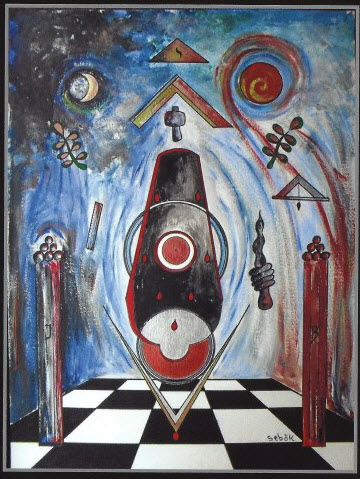The road in Masonry is simple, as it is represented by three stations or degrees.
A candidate is first initiated into Free-masonry and becomes an Entered Apprentice. He is under training and young. Surely, he has difficulty in understanding what is going around him.
The second station, which is also called the “midway”, is the Fellow-craft. It is when the Entered Apprentice is leaving his stage of youth and “Passing” into maturity. Maturity always comes with the desire to learn and discover areas that might have been under the young Entered Apprentice’s mind’s detection.
At the Fellow-craft degree, first a mason is a fellow of other brothers, meaning he is within the brotherhood and, second he has reached a worthy place in this brotherhood.
The third and last station is also the height of Masonry. It is also referred to as the sublime degree of a “Master Mason”.
A Fellow craft is “Raised” to become a Master Mason. This raising symbolizing the resurrection from the Dead.
So, why masonry needs to recruit death?
Indeed, this has given place for arguments from some people that, masons are copying the Bible or other ancient cultures and traditions. That Masonic path is a promise to eternal life. That masons practice supernatural powers. Or simply that it is just a play and that the ritual makes it only more interesting.
No doubt that death levels all men.
It is my believe that the rituals of Freemasonry, as ancient as they are, present an understanding of human nature and that they are meant to teach something or to convey a point.
As said above, reaching the degree of a Master Mason, is the highest achievement of a man. So why is his reward with death?
In the Masonic story of Hiram Abiff, three men (fellow-crafts) slain (murder) Hiram Abiff as they unsuccessfully try to get the secrets of a Master Mason. They considered this action justified to get to their goal: the secrets of the Master Mason. Their set of values allowed them to kill in order to get to their goal, happiness and joy.
On the other hand, Hiram Abiff had his own set of values: to protect the secrets of the Master Mason, as he swore when he received them. He defended his values bravely to his death. It is important to take note of the two different sets of values presented in the story.

The first is of the Master Mason Hiram Abiff, one of the main builders of Solomon’s Temple, which is of spiritual importance. It would be correct to assume that Hiram Abiff observed a spiritual life and full understanding of spirituality, because he was designing and building the Temple that many people will turn to to fulfill their spiritual need. A mason cannot build a perfect hospital, if he doesn’t have any idea of the needs of the sick! Hiram Abiff’s spiritual life made his worldly life different because his joy was in holding firmly to his sets of values bravely even if it resulted in his death. Surely, Hiram Abiff had the choice to reveal the secrets and escape from his death. Under the circumstance, no one would have blamed him, but for sure, by doing so, he might have lived a miserable and an unhappy life.
The second set of values is of the Fellow-crafts’. Achieving their worldly goals makes them happy, joyful and satisfied. Their worldly values allowed them to kill in order to achieve their goals.
Hiram Abiff regards ‘man’ as the purpose, but not the worldly goals. For his killers, ‘man’ has no purpose but achieving goals. The goals are the purpose! One simply exploits and uses other men or own-self just to achieve worldly goals. In other words, Hiram Abiff’s set of values regard “man” to be more important than life’s goals.
The Death of the Master Mason Hiram Abiff, is there not to dramatize or to copy sources, or to plant fear in the heart of people. Rather, Death is there to remind us of it. Death is there to remind us of our oath, obligation and the end of everyone’s way.
The Volume of the Sacred Law mentions
death many times, in different contexts. I shall not enter into that. But, dear
reader, how many times have you spoken with your children or parents or loved
ones about death? Wouldn’t we prefer to talk about life without the death
ingredient?
Freemasonry concludes that we must acknowledge life as it is, that it has an end – death. We cannot live for ever (at least not for now)!

The secret of Hiram Abiff’s death lies in that it hopes to make you see ‘man’ as a purpose. It hopes to make you understand that goals are not the purpose. Freemasonry has no goals other than ‘man’! Being among men and interacting with men! By having towards men respect, kindness, mercy and love, freemasonry holds that thus we shall grow spiritually happy and our love to fellow man shall grow strong.
All those who come to freemasonry to fulfill and to achieve goals shall be unhappy among men!
Sincerely & Fraternally, V.W. Brother H. K